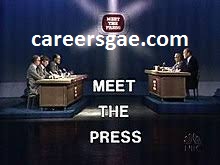“Meet the Press,” one of the longest-running television programs in American history, has been a cornerstone of political journalism since its inception in 1947. In Season 76, Episode 35, the show continues its legacy of probing interviews, thoughtful analysis, and the exploration of pressing political issues facing the nation. This episode exemplifies the program’s commitment to informing the public and fostering meaningful discussions in an ever-changing political landscape.
Overview of the Episode
Meet the Press Season 76, Episode 35 features a lineup of prominent political figures, analysts, and commentators who discuss a range of critical topics. The episode opens with a focus on the current state of the economy, inflation rates, and the impact of recent legislative measures on American families. As the host engages guests, the conversation shifts to pressing political dynamics, including the upcoming elections and key issues that will shape voter sentiment.
One of the highlights of the episode is an interview with a leading political analyst, who provides insights into the strategies that political parties are employing as they prepare for the next election cycle. The discussion delves into the significance of grassroots movements, the influence of social media, and the changing demographics of the electorate.
The Importance of Political Discourse
“Meet the Press” has always played a pivotal role in fostering political discourse. In an age where misinformation and polarized opinions can dominate public conversation, the program seeks to provide viewers with accurate information and diverse perspectives. The format of the show, which combines interviews with data-driven analysis, encourages viewers to think critically about the issues at hand.
In Episode 35, the host challenges guests with difficult questions, promoting an environment where accountability is paramount. This approach not only helps to clarify complex issues but also encourages transparency among political leaders. By addressing uncomfortable topics head-on, “Meet the Press” empowers its audience to engage in informed discussions about the political landscape.
The Role of Media in Democracy
The media’s role in a democratic society cannot be overstated. Programs like “Meet the Press” serve as a platform for open dialogue, allowing citizens to stay informed about governmental actions and policies. The responsibility of journalists extends beyond reporting; they must analyze, interpret, and contextualize information to provide a comprehensive view of the issues.
During the episode, the conversation about media integrity is particularly poignant. The host emphasizes the need for responsible journalism in an era of fake news and sensationalism. Guests discuss the challenges faced by news organizations and the importance of maintaining trust with the audience. By prioritizing factual reporting and ethical standards, “Meet the Press” reinforces the critical role of the media in upholding democratic values.
Diversity of Perspectives
Another hallmark of “Meet the Press” is its commitment to presenting diverse viewpoints. Episode 35 features guests from various political affiliations and backgrounds, each bringing their unique perspectives to the discussion. This diversity enriches the conversation and helps viewers understand the complexities of political issues.
The episode underscores the importance of listening to opposing viewpoints, a principle that is essential in a functioning democracy. By providing a platform for differing opinions, “Meet the Press” encourages viewers to engage in thoughtful discourse, promoting empathy and understanding among those with varying beliefs.
Impact on the Political Landscape
The influence of “Meet the Press” extends beyond its weekly broadcasts. The program has a longstanding history of shaping political narratives and impacting public opinion. Political leaders often use their appearances on the show to communicate key messages and rally support for their agendas. In Episode 35, the discussions surrounding economic policies and social issues may have implications for upcoming legislation and election outcomes.
Moreover, the show’s ability to adapt to changing times is commendable. As technology and communication methods evolve, “Meet the Press” has embraced new platforms, reaching younger audiences through social media and digital content. This adaptability ensures that the program remains relevant and continues to inform the public on pressing issues.
Conclusion
“Meet the Press” Season 76, Episode 35 exemplifies the program’s enduring commitment to fostering political discourse and informing the American public. Through its thoughtful interviews, diverse perspectives, and emphasis on accountability, the show reinforces the importance of responsible journalism in a democratic society.
In a world rife with misinformation and polarization, programs like “Meet the Press” serve as vital resources for citizens seeking to understand complex political issues. By encouraging open dialogue and critical thinking, the show empowers viewers to engage meaningfully in the democratic process.
As the political landscape continues to evolve, the role of programs like “Meet the Press” becomes increasingly significant. The need for informed, thoughtful discourse is paramount, and this episode underscores the importance of maintaining that dialogue. In doing so, “Meet the Press” not only informs but also inspires active participation in the democratic process, ensuring that the voices of the American people are heard and respected.



